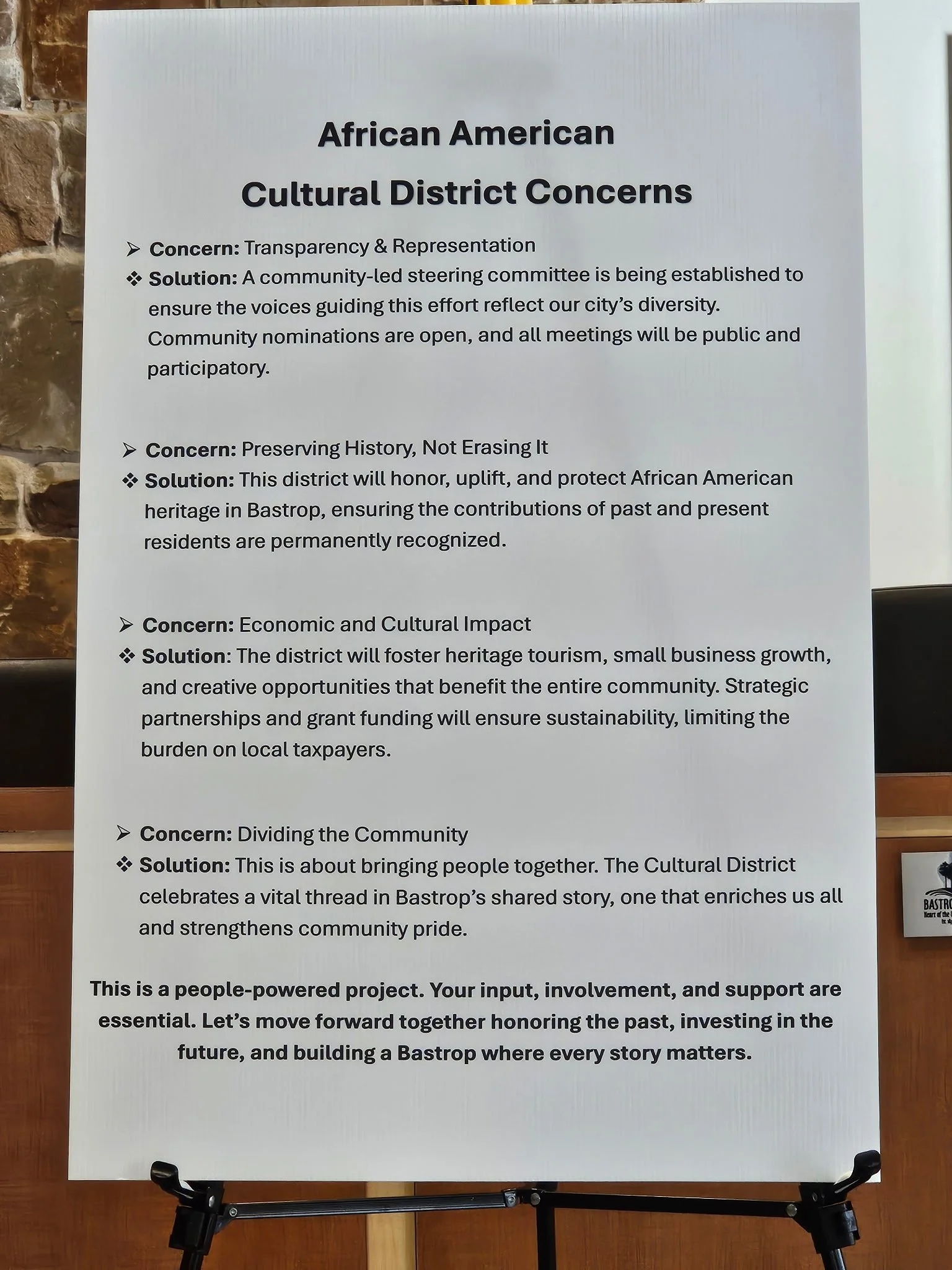From Conversation to Commitment: Organizing the South End’s Next Chapter
On the warm evening of July 30, 2025, Bastrop residents once again gathered with purpose, determination, and a shared vision at the second South End Town Hall Meeting. With the momentum of July 9 still fresh, the focus of this gathering was clear: to formally begin the process of establishing a Steering Committee for the South End African American Cultural District.
Mayor Harris opened the meeting with appreciation, recognizing the cultural and emotional weight of the moment. "This is about more than a district on a map," he said. "This is about our city’s identity, about history that deserves to be preserved and honored.”
Council Member Perry Lowe, serving as the city’s liaison to the effort, took the floor to outline the path ahead. "This is a commitment to community and culture," he said. "We’re not just naming streets or buildings—we're preserving a legacy." He emphasized that the committee would be rooted in community voices: elders, educators, historians, artists, faith leaders, and anyone with a deep connection to the South End.
Structuring the Steering Committee
The Steering Committee, he explained, would be supported by subcommittees focused on key areas:
Recorder: Responsible for minutes and documentation
Community Outreach: Organizing listening sessions, engaging local residents
Heritage Research: Collecting historical data and verifying facts
Funding and Grants: Pursuing financial support through grassroots and foundation sources
PR and Marketing: Promoting awareness through branding, storytelling, and visibility
These working groups would help ensure that the district reflects the history and aspirations of the community it honors.
Community Voices and Concerns
Residents raised both hopes and questions. Some worried about historic designations increasing renovation costs. Council members and planning officials clarified: No one is being forced to register their homes as historic properties. The process will remain voluntary. The district’s cultural identity would be affirmed through signage, monument markers, murals, and public art—not restrictive overlays.
Others asked about economic revitalization, and whether business development would be part of the district's growth. While no large-scale construction was planned, it was acknowledged that future business development was possible depending on land availability and community interest.
A key point emerged: before anything else, the committee must first define the district's boundaries, identify its key cultural sites, and assess properties in need of restoration. “Let’s first figure out what we have, where we are, and what’s at risk,” said one community member. “Then let’s get to work.”
Attendees were reassured that primary funding for the project will come from grants and partnerships—not taxpayer dollars. The initiative is not intended to displace residents or raise housing costs. Its core mission is to preserve, protect, and invest in the African American Cultural District known as the South End.
Photo by Robert “Doc” Washington Photography
Community Reflections
One lifelong resident reminded the room, “We had everything we needed in the South End—our barbershops, our teachers, our elders, our pride. This is about showing our grandchildren what we built.”
Another added, “Let’s be clear about our purpose. This isn’t about pushing people out—it’s about inviting everyone in, to understand, to learn, and to preserve.”
Local leaders from the Rotary Club and other civic organizations voiced support, offering to help with home repairs and beautification efforts. Artists and cultural workers discussed plans for signage, murals, and events like the developing South End Music Festival—a space for community gathering, local food, and music.
Next Steps
By the end of the night, eleven new Steering Committee interest forms had been submitted. Organizers committed to scheduling the committee's first working meeting for August 14, 2025 at 6:30 PM and to keeping future sessions transparent and inclusive.
Mayor Harris and Council Member Lowe closed the evening with gratitude and a reminder: “This work won’t be easy. But it’s necessary. And it’s ours to do—together.”
As one speaker said simply, “This is still home. Let’s keep it alive.”


